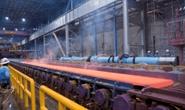Market Segment

February 22, 2018
Ternium to Supply Slabs to Calvert, Despite Section 232
Written by Sandy Williams
Ternium has extended its agreement to supply steel slabs to AM/NS Calvert for an additional 12 months, until December 2020. During Ternium’s fourth-quarter earnings call, CEO Daniel Novegil said Ternium Brazil will deliver the remaining 3.5 million metric tons of slab in annual increments of 1.2 million tons per year instead of 2.0 million tons as previously scheduled.
The extension will free up slab produced at the Mexican operation for use at its new hot strip mill in Pesqueria that will come on line in 2020, said Novegil. The Pesqueria facility currently produces 400,000 metric tons of hot-dip galvanized coil and 1.5 million tons of cold-rolled coil. The hot strip line will add an additional 3.7 million tons per year of finished steel capacity.
When asked about possible tariffs on the steel coming into Calvert as a result of Section 232 measures, Novegil said shipments would be on a “delivery duty-unpaid” basis, therefore placing any additional costs on the customer.
CFO Pablo Brizzio called the Department of Commerce Section 232 recommendations “harsh.” High tariffs or quotas could add heavy burdens for U.S. manufacturers and increase consumer costs, said Brizzio.
“We really don’t know where this is going. As to what effects this will have for Ternium, based on the information that we have today, we don’t anticipate a significant impact for us in the near future.” Brizzio included in that assessment exports to the United States from both its Brazilian and Mexican operations, adding that Ternium exports from Mexico to the U.S. are “quite marginal.”
Mexico steel pricing follows U.S. pricing, but U.S. pricing is likely to increase quicker in the event of Section 232 action, said Brizzio. He was confident that the Mexican government will take action to avoid collateral effects on free trade.
Steel demand is expected to grow 3.0 percent in Mexico with most growth coming from the industrial sector, said Novegil. The auto and HVAC sectors are not expected to meet 2017 demand levels.
Novegil said NAFTA negotiations are causing some short-term uncertainty that may be delaying some investments in the industry. “We believe that the trade between the U.S., Canada, and Mexico will continue with or without the negotiation of the NAFTA agreement, because it’s evident that it benefits all the parties involved.”
“I think it’s worth mentioning that the U.S. exports considerably more steel to Mexico than what Mexico exports to the U.S. So today, almost 50 percent of all the imports in Mexico come from the U.S.,” said Novegil. “To be honest, it will make no sense for the U.S. to impose tariffs on the import of Mexican steel and get appropriate retaliation from the Mexican government for the export of U.S. steel to Mexico.”







